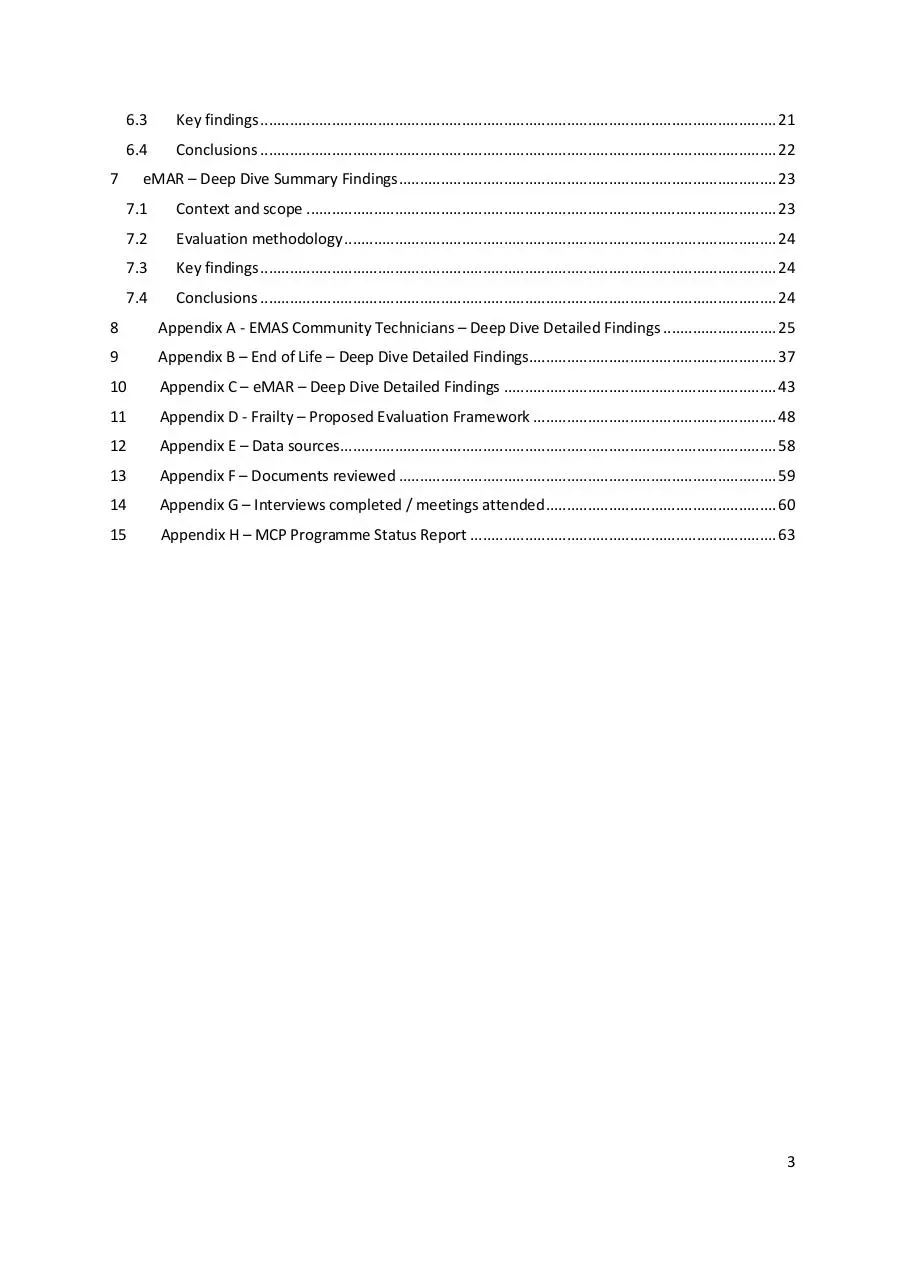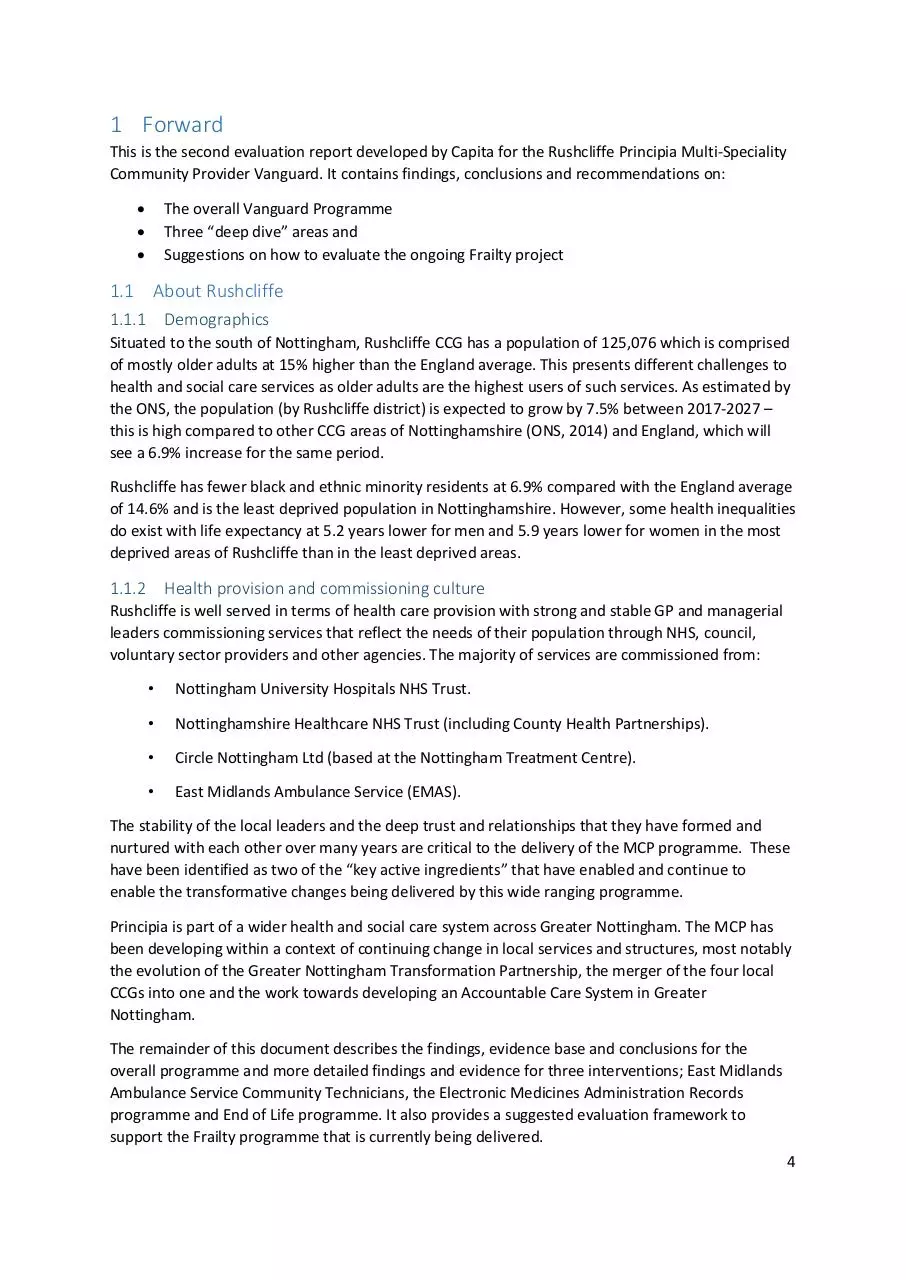Rushcliffe Principia MCP Evaluation Phase 2 Report (4) (2) (PDF)
File information
Author: Matt Hill
This PDF 1.5 document has been generated by Microsoft® Word 2016, and has been sent on pdf-archive.com on 30/04/2018 at 12:13, from IP address 194.176.x.x.
The current document download page has been viewed 664 times.
File size: 2.43 MB (64 pages).
Privacy: public file





File preview
Evaluation Report for Phase Two of the
Principia Multi-Speciality Community
Provider Vanguard
Prepared by Matt Hill and Julia Eadie
Capita November 2017
1
Contents
1
Forward ........................................................................................................................................... 4
1.1
2
3
4
1.1.1
Demographics
................................... 4
1.1.2
Health provision and commissioning culture
................................... 4
1.1.3
How to use this report
................................... 5
Executive summary ......................................................................................................................... 6
2.1
Context .................................................................................................................................... 6
2.2
Evaluation structure ................................................................................................................ 6
2.3
Key findings, conclusions and recommendations ................................................................... 7
2.3.1
Programme level findings
................................... 7
2.3.2
Deep Dive Programmes
................................... 7
2.3.3
Conclusions and recommendations
................................... 8
Phase 2 Programme evaluation ...................................................................................................... 9
3.1
Programme Structure ............................................................................................................. 9
3.2
Background and context ......................................................................................................... 9
3.3
Evaluation questions ............................................................................................................. 10
Programme Level Findings ............................................................................................................ 11
4.1
Evaluation methodology ....................................................................................................... 11
4.2
Context .................................................................................................................................. 11
4.3
Findings ................................................................................................................................. 12
4.3.1
Reputation, leadership and culture
................................. 12
4.3.2
Patient Experiences
................................. 13
4.3.3
Staff experiences
................................. 13
4.3.4
Staff survey
................................. 14
4.4
5
6
About Rushcliffe ...................................................................................................................... 4
Conclusions ........................................................................................................................... 15
EMAS Community Technicians – Deep Dive Summary Findings................................................... 18
5.1
Context and scope ................................................................................................................ 18
5.2
Evaluation methodology ....................................................................................................... 18
5.3
Key findings ........................................................................................................................... 18
5.4
Conclusions ........................................................................................................................... 19
End of Life – Deep Dive Summary Findings................................................................................... 21
6.1
Context and scope ................................................................................................................ 21
6.2
Evaluation methodology ....................................................................................................... 21
2
6.3
Key findings ........................................................................................................................... 21
6.4
Conclusions ........................................................................................................................... 22
7
eMAR – Deep Dive Summary Findings .......................................................................................... 23
7.1
Context and scope ................................................................................................................ 23
7.2
Evaluation methodology ....................................................................................................... 24
7.3
Key findings ........................................................................................................................... 24
7.4
Conclusions ........................................................................................................................... 24
8
Appendix A - EMAS Community Technicians – Deep Dive Detailed Findings ........................... 25
9
Appendix B – End of Life – Deep Dive Detailed Findings........................................................... 37
10
Appendix C – eMAR – Deep Dive Detailed Findings ................................................................. 43
11
Appendix D - Frailty – Proposed Evaluation Framework .......................................................... 48
12
Appendix E – Data sources........................................................................................................ 58
13
Appendix F – Documents reviewed .......................................................................................... 59
14
Appendix G – Interviews completed / meetings attended ....................................................... 60
15
Appendix H – MCP Programme Status Report ......................................................................... 63
3
1 Forward
This is the second evaluation report developed by Capita for the Rushcliffe Principia Multi-Speciality
Community Provider Vanguard. It contains findings, conclusions and recommendations on:
•
•
•
The overall Vanguard Programme
Three “deep dive” areas and
Suggestions on how to evaluate the ongoing Frailty project
1.1 About Rushcliffe
1.1.1 Demographics
Situated to the south of Nottingham, Rushcliffe CCG has a population of 125,076 which is comprised
of mostly older adults at 15% higher than the England average. This presents different challenges to
health and social care services as older adults are the highest users of such services. As estimated by
the ONS, the population (by Rushcliffe district) is expected to grow by 7.5% between 2017-2027 –
this is high compared to other CCG areas of Nottinghamshire (ONS, 2014) and England, which will
see a 6.9% increase for the same period.
Rushcliffe has fewer black and ethnic minority residents at 6.9% compared with the England average
of 14.6% and is the least deprived population in Nottinghamshire. However, some health inequalities
do exist with life expectancy at 5.2 years lower for men and 5.9 years lower for women in the most
deprived areas of Rushcliffe than in the least deprived areas.
1.1.2 Health provision and commissioning culture
Rushcliffe is well served in terms of health care provision with strong and stable GP and managerial
leaders commissioning services that reflect the needs of their population through NHS, council,
voluntary sector providers and other agencies. The majority of services are commissioned from:
•
Nottingham University Hospitals NHS Trust.
•
Nottinghamshire Healthcare NHS Trust (including County Health Partnerships).
•
Circle Nottingham Ltd (based at the Nottingham Treatment Centre).
•
East Midlands Ambulance Service (EMAS).
The stability of the local leaders and the deep trust and relationships that they have formed and
nurtured with each other over many years are critical to the delivery of the MCP programme. These
have been identified as two of the “key active ingredients” that have enabled and continue to
enable the transformative changes being delivered by this wide ranging programme.
Principia is part of a wider health and social care system across Greater Nottingham. The MCP has
been developing within a context of continuing change in local services and structures, most notably
the evolution of the Greater Nottingham Transformation Partnership, the merger of the four local
CCGs into one and the work towards developing an Accountable Care System in Greater
Nottingham.
The remainder of this document describes the findings, evidence base and conclusions for the
overall programme and more detailed findings and evidence for three interventions; East Midlands
Ambulance Service Community Technicians, the Electronic Medicines Administration Records
programme and End of Life programme. It also provides a suggested evaluation framework to
support the Frailty programme that is currently being delivered.
4
1.1.3 How to use this report
This report is structured for ease of reading at different levels of detail. The executive summary
provides a rapid overview of the programme, progress being made against the interventions
identified and the evidence base that supports it. The main body of the report describes the
interventions in more detail and finally the appendices provide more detail on the methodologies
and modelling used to analyse the evidence and draw out the conclusions highlighted in the report.
5
2 Executive summary
2.1 Context
Rushcliffe was chosen by NHS England as one of 50 Vanguards across the country to lead significant
changes in the way local health and social care services are delivered receiving national funding to
help improve the quality of local health and social care. Principia – a local partnership of GPs,
patients and community services, became established as a Multi-Specialty Community Provider
(MCP) in order to lead this work.
Principia set out to change how health and social care services are delivered in Rushcliffe using the
knowledge and experience of the doctors, nurses, patients and carers to make services more
straightforward, consistent and accessible, with health and social care working together effectively.
Principia set out its vision and plans in detail in its Value Proposition, outlining the following success
criteria:
•
Create a far more cost efficient and clinically effective model of care.
•
Fully integrate all local health and social care provision.
•
Transfer all care to the right place.
•
Focus on prevention, early diagnosis and management of risk factors.
•
Target resources more effectively based on detailed understanding of population need.
It was agreed that the phase two evaluation would include measuring the impact of the MCP’s work
in terms of patient experience and system outcomes whilst capturing learning and identifying
opportunities to spread the initiatives specifically across the Greater Nottingham area.
2.2 Evaluation structure
The evaluation was structured to undertake a high-level review of the overall programme, deeper
dives into three speciality areas outlined in Figure 1 and the development of an evaluation
framework to support the Frailty workstream.
Figure 1 Evaluation structure
The evaluation findings were used to answer eight nationally determined questions which were
arranged into the four following categories: context and rationale, implementation and what works,
system outcomes, and patient and staff experience and outcomes
6
2.3 Key findings, conclusions and recommendations
2.3.1 Programme level findings
The programme consists of ten clinically-focused workstreams and an enabling workstream. The
programme is in its third year.
Rushcliffe is demonstrating positive results for those projects being delivered in all workstreams. A
document review, interviews with the programme, clinical, and workstream service leads and a GP
survey show that these results are being enabled by a long history of established community care
delivery coupled with strong cooperation across general practice. There is a real ‘can do’ mentality
within the GP community with a mind-set that is open to new ways of working rather than one of
cynicism. There is a notably higher level of trust and regard between clinicians across the system
than we have seen elsewhere and a forward thinking, responsive community provider in
Nottinghamshire Healthcare NHS Foundation Trust alongside the independent care sector providers
in the area.
Emerging evidence shows the programme is demonstrating positive changes in patient outcomes
and savings. Two examples that illustrate this, from the elective care workstream, are the
standardisation of referral processes which are now being rolled out to wider Nottinghamshire, and
the redesign of gynaecology first outpatient attendances which has resulted in a reduction of around
a fifth against the activity plan. This trend has continued into 2017-18, with an estimated full year
effect saving of £71k for the current financial against the previous year as a baseline. The MCP
estimates an annual recurrent system saving of £506k should Principia’s community gynaecology
service model be applied across the Greater Nottingham footprint. This is currently being explored
by the Greater Nottingham CCGs amongst others.
2.3.2 Deep Dive Programmes
Our deep dive evaluations in both phase one and phase two, as well as reports by other external
evaluators, have found models of care that are working well in improving patient outcomes and
experience and joining up care to support patients to remain at home or receive care closer to
home. Examples include:
•
Increasing patients not conveyed by ambulance to hospital to 41% from a baseline of 32%
under the EMAS Community Technicians scheme.
•
568 new cases of atrial fibrillation identified which the MCP estimates is resulting in 28 less
strokes per year and 9 avoided deaths per year.
•
A statistically significant increase in both clinician and patient reported outcome measures in
the primary care psychological medicine pilot.
•
More patients enabled to receive care closer to their home, for example through the
extension of community outpatient clinics (see phase one evaluation report).
While several of the programmes are delivering savings, there is now significant potential to make
even more impact for patients and deliver more savings by applying the models at scale in Rushcliffe
and across Greater Nottingham. Some schemes, such as the East Midlands Ambulance Service nonconveyancing Scheme will need to be operated at scale to be sustainable based on the current
contracting model.
7
2.3.3 Conclusions and recommendations
In the areas we have explored in phase one and phase two the MCP is delivering significant
improvements in patient outcomes and experience through excellent system relationships which are
delivering more integrated care closer to home. Savings are also being delivered in many instances.
Having proven these models in Rushcliffe, there is now significant potential to make even more
impact for patients and deliver even larger savings by applying the models at scale in Rushcliffe and
across Greater Nottingham.
8
3 Phase 2 Programme evaluation
3.1 Programme Structure
Capita held several scoping sessions with the MCP to identify priorities for phase two and design the
evaluation approach. This included establishing the impact of the MCP’s work in terms of both
patient experience and system outcomes whilst capturing learning and identifying opportunities for
spread specifically across the Greater Nottingham area. To this end, it was agreed that the
evaluation should report on the overall programme level combined with detailed work in three deep
dive areas – East Midlands Ambulance Service (EMAS) Community Technicians, Electronic Medicines
Administration Record (eMAR) and End of Life (see Figure 1 above). The deep dives were selected on
the basis that they were sufficiently mature for evidence to be available on their effectiveness, as
well as providing a reasonable cross-section of different areas of MCP activity. A fourth area of focus,
frailty, was selected on the basis that the intervention was in the process of being implemented and
the MCP was keen to have independent support in developing an evaluation framework with which
to measure its impact and capture learning.
3.2 Background and context
Rushcliffe was chosen by NHS England as one of 50 Vanguards across the country to lead significant
changes in the way local health and social care services are delivered receiving national funding to
help improve the quality of local health and social care. Principia – a local partnership of GPs,
patients and community services – became established as a Multi-Specialty Community Provider
(MCP) in order to lead this work.
Through the vehicle of the MCP, Principia set out to change how health and social care services are
delivered in Rushcliffe. Its intention is to use the knowledge and experience of the doctors, nurses,
patients and carers to make services more straightforward, consistent and accessible, with health
and social care working together effectively. This includes collaborating with PartnersHealth (the
local partnership of GPs) and Nottinghamshire Healthcare NHS Foundation Trust (the principal local
provider of community services) with the intention that services coming under one umbrella
organisation will facilitate more integrated working and promotes a culture of ‘mutual
accountability’ for improving patient experience and outcomes. A new contract for these services
essentially makes it “everyone’s business” and responsibility to deliver joined-up care that is focused
on people’s individual needs and them having a positive experience of care.
Principia sets out its vision and plans for doing this in detail in its Value Proposition, which includes
the following success criteria:
•
Create a far more cost efficient and clinically effective model of care.
•
Fully integrate all local health and social care provision.
•
Transfer all care to the right place.
•
Focus on prevention, early diagnosis and management of risk factors.
•
Target resources more effectively based on detailed understanding of population need.
Figure 2 overleaf summarises the intended future state.
9
Download Rushcliffe Principia MCP Evaluation Phase 2 Report (4) (2)
Rushcliffe Principia MCP Evaluation Phase 2 Report (4) (2).pdf (PDF, 2.43 MB)
Download PDF
Share this file on social networks
Link to this page
Permanent link
Use the permanent link to the download page to share your document on Facebook, Twitter, LinkedIn, or directly with a contact by e-Mail, Messenger, Whatsapp, Line..
Short link
Use the short link to share your document on Twitter or by text message (SMS)
HTML Code
Copy the following HTML code to share your document on a Website or Blog
QR Code to this page

This file has been shared publicly by a user of PDF Archive.
Document ID: 0000762506.